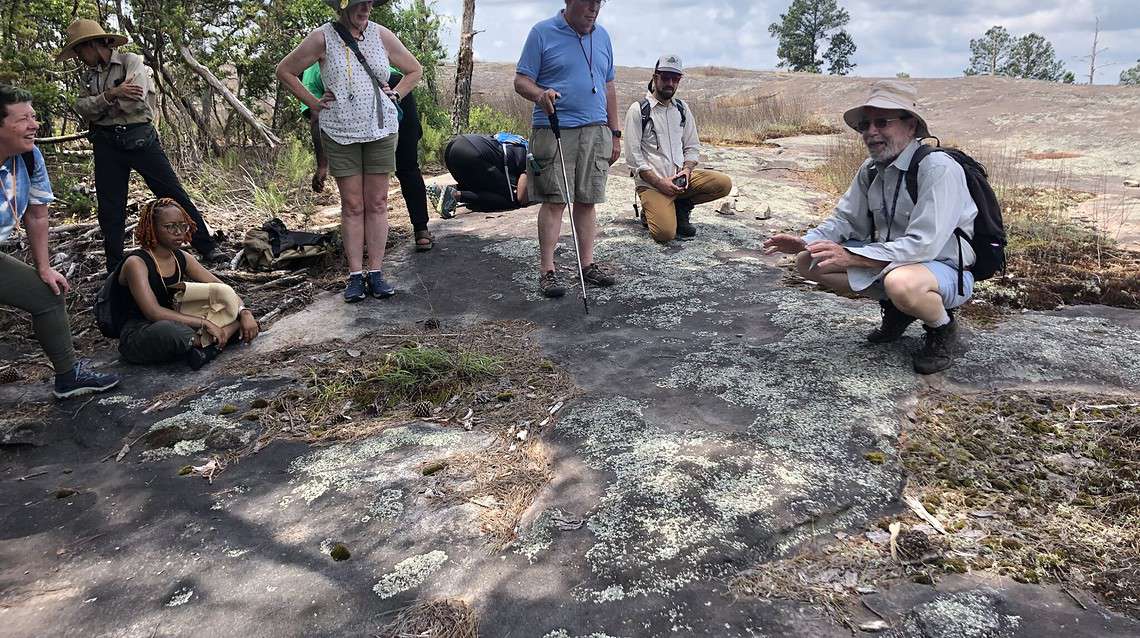Geology and Culture with the DeKalb Beloved Naturalist Program

By Sally Sears, Co-Founder of the DeKalb Beloved Naturalist Program
“If these rocks could talk…” we might better understand our natural world. That was a lesson for the founding class of DeKalb Beloved Naturalists on May 21, 2022 at Arabia Mountain.

DeKalb Beloved Naturalist class preparing to hike up Arabia Mountain.
In front of a photograph of Dr. Martin Luther King Jr at the foot of the Lincoln Memorial, instructor Bill Witherspoon brought a fresh insight to the famous “I Have a Dream” speech.
The Lincoln statue? It is made of Georgia marble. The mountains Dr King named form three of Georgia’s most important geologic formations.
“Let freedom ring from the Stone Mountain of Georgia!” That’s the Piedmont.
“Let freedom ring from Lookout Mountain in Tennessee!” The Appalachian plateau.
“Let freedom ring from every hill and molehill in Mississippi.” That’s the coastal plain, just like the bottom half of Georgia.
“Many people, maybe most, have trouble naming the rocks beneath their feet”, said Dr. Witherspoon. “They usually know some kinds of trees and names of birds, but not rocks.”
And that’s a shame, he said, because our sense of place, important to understanding the natural world, begins with what’s underneath the dirt.

DeKalb Beloved Naturalist class on Arabia Mountain.
He underlined the point with a graphic image of Georgia, Alabama and Mississippi, a black belt of rich soil swooping through the middle. A similar crescent showed historic cotton production, farmed by enslaved laborers. And then a modern map of voting patterns showed heavy percentages of votes cast for Democratic party candidates. Dr. Witherspoon says the political lives of the people living today on top of that ancient crescent are still affected by the geology.
Geology certainly predicted the culture of the lives of people living around Arabia Mountain. The DeKalb Beloved Naturalist class climbed the mountainside quarried of its rock face by area workers, learning the origins of the swirls of quartzite, gneiss and salt and pepper granite.
Then Malcolm Hodges showed the faint green and white coloring growing on the unquarried top of the mountain’s surface. Lichens! “Farmers of algae,” he called them, and in minutes the class was stooping and bending with hand lenses to identify some of Georgia’s 900+ lichen species.

In the classroom at the Davidson-Arabia Mountain Nature Center.
Arabia’s harsh mountain conditions created extreme homes for bushy, crusty and flattened kinds of lichens. Dr. Hodges reminded the group that lichens can be good predictors of environmental trouble. Some pollution-tolerant lichens are thriving in metro Atlanta while sensitive species are disappearing.
His work creating an Atlas of Georgia lichens is captured on an important website, GeorgiaBiodiversity.Org/portal. On it, he says “Lichens greatly enhance the diversity and complexity of natural ecosystems, both for the lichens themselves and the niches they provide for many invertebrates and micro-organisms.”
The DeKalb Beloved Naturalist program aims to address the need for diversity in naturalist classes and environmental fields in general.
The ultimate goal of the DeKalb Beloved Naturalist Program is to facilitate environmental stewardship in communities across the Atlanta metro, connecting people with the vibrant natural history right in their backyards.
The DeKalb Beloved Naturalist Program is the result of a partnership between staff of AARP; Arabia Mountain Heritage Area Alliance; Atlanta Forest School; DeKalb County Department of Parks, Recreation & Cultural Affairs; Emory University; Gardens for Growing Community; Georgia Audubon Society; Monarch Collaborations & Consulting and South Fork Conservancy. The list of partner organizations continues to grow as this first year of the program progresses.
To learn more, inquire about program participation, or to support this budding effort, people can reach out to dekalbbelovednaturalist@gmail.com.